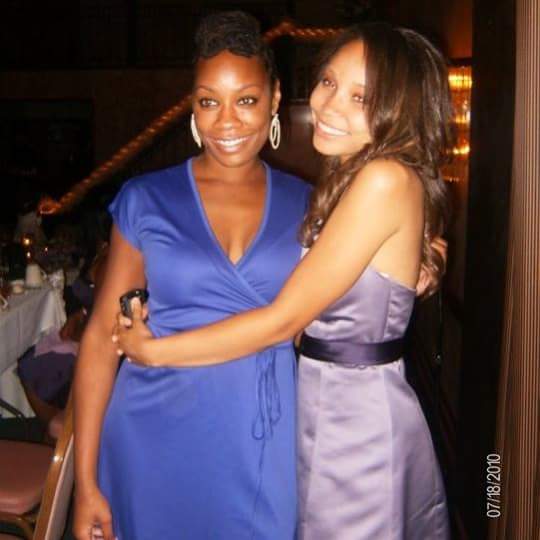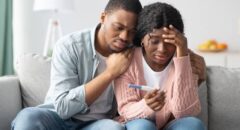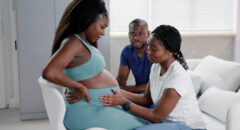
I'm proud to see more articles addressing the stigma of mental and emotional health in Black communities, especially around the whole 'Strong Black Woman' super character we grew up with. I'm not ashamed to admit that I suffered from postpartum depression as a teen mother between the ages of 16-19, followed by severe anxiety and depression by the time I was 22, and a professional diagnosis that confirmed I needed help at 25. I wouldn't accept this as my story or something passed down through my bloodline, so I refused help and dealt with it in silence and self-sabotaging behavior.
I thought depression to be a sign of weakness, laziness or an excuse and I did everything to conceal it in me and convince myself that I was strong and strong women don't break. During that time, my daughter gave me enough fuel to semi-hide from my condition and keep it together so that we could both have what I perceived to be a 'normal' life.
It wasn't until 2010, the year my bestfriend was killed by police for being 'off his meds,' and a year before my daughter left home for college that something triggered and I subconsciously started to remove all distractions and everything familiar in search of self beyond motherhood.
 I'd buried myself in 22 years of pain, disappointments, lies, insecurity, confusion and fear. By June 2011, there were no more career achievements to mask my insecurities. No more small daughter to care for. No man to hide under. No parties and alcohol to drown in and no material things to mask the ugly I felt. Just me and the heavy layers that needed to be carefully addressed, nurtured, forgiven and removed.
I'd buried myself in 22 years of pain, disappointments, lies, insecurity, confusion and fear. By June 2011, there were no more career achievements to mask my insecurities. No more small daughter to care for. No man to hide under. No parties and alcohol to drown in and no material things to mask the ugly I felt. Just me and the heavy layers that needed to be carefully addressed, nurtured, forgiven and removed.
READ: Why PTSD Is Undiagnosed In Many Black Women
What I quickly came to admit to myself is that depression doesn't mean you're weak. It means you're off balance and failing to do something to counter it will become extremely problematic. This looks different for everyone as far as methods and time. Now at 38, I still live with this battle, but I finally fully accept who I am and that none of us are what society defines as normal. We're as unique as our fingerprints, with varying perspectives and trauma combinations.
Healing for me means first understanding that this is an ongoing battle that requires me to be proactive in doing daily work to create a body immune to the symptoms of depression. I've learned to be patient with myself, and little by little, I'm winning the civil war that has inflicted me for 22 years.
Since I stay away from anti-depressant medications, here are 5 things that help me before, during and after depression attacks:
1. Talking to trusted folks that are great listeners and non-judgmental. They totally just listen and are good at saying a lot with very few words. I have two people in my life like this. My issue is that sometimes I'm hit harder than others and it can last for weeks versus days. It's times like this I don't want to burden anyone and I shut down. I've finally decided to be proactive and hire a professional non-traditional therapist/coach to help me figure out some things and keep me focused using alternative practices and herbs.

2. Exercise and leafy foods! When I'm working out, I'm channeling my frustrations, pain and feelings of hopelessness. I'm getting better at this because depression cripples you mentally then emotionally and then physically, making you want to isolate yourself....in the bed. You got to push past those voices that say you're nothing but a failure and take everything emotional out physically. This makes me feel stronger and capable. Leafy foods are light and give me energy. I will stop eating when depressed because I lose my appetite for not just life, but my first love, food. This isn't good at all and most times I have to set alarms to force feed myself. Brain foods like blueberries, tomatoes, flaxseed and salmon are a few of my favorites because they help me to counter negative thoughts and think more clearly about things.
READ: Foods That Make Your Depression Worse

3. I write and create things - A LOT! People like me stay in our heads. This is why it's not hard for me to deal with multiple things at once, or shoot out ideas like a faucet does water - my brain never shuts down. I'm always thinking, reflecting and building. Staying busy creatively while silencing my thoughts by focusing in on music (jazz and classical specifically) helps to focus and relax me. I think I've listened to everything Mozart has done in the past six weeks.
4. I laugh and do things with people that mean the most to me. They are reminders of what makes life great and we tell each other things like 'You're dope. Hey beautiful. You betta werk! Slay! and I love you sis'. Times like these you remember that this is only a moment and you're fabulous and loved all the time despite this moment of feeling something opposite.
5. I read stories of perseverance from across the globe. There is something about the will of others to LIVE in the face of extraordinary circumstances that feed me hope and give me a new wind. Great quotes, speeches and movies have the same impact on me.
It's critical we love on each other. People usually suffer in silence and function everyday until they break down from a traumatic experience or shifts. Be there with an ear, an activity, love and laughter. Leave the judgement at home.
To share your inspiring health story as part of our My Story series, email [email protected].









